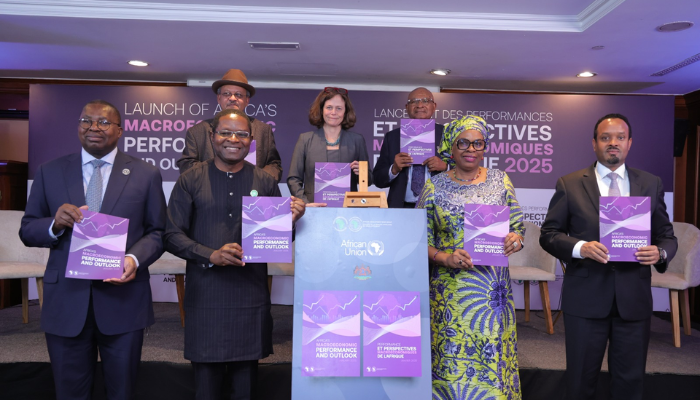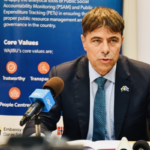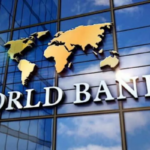Africa’s economic growth is showing improvement despite persistent global challenges, according to the 2025 Macroeconomic Performance and Outlook (MEO) report released by the African Development Bank. The report, presented during the 38th Ordinary Session of the African Union Assembly in Addis Ababa, forecasts real GDP growth to rise to 4.1 per cent in 2025 and 4.4 per cent in 2026.
The growth projections are attributed to economic reforms, declining inflation, and improved fiscal and debt positions. However, the report highlights that Africa’s growth remains below the 7 per cent threshold required for substantial poverty reduction. The continent also faces ongoing geopolitical tensions, structural weaknesses, climate-related disasters, and conflicts in regions such as the Sahel and the Horn of Africa.
Africa’s average real GDP growth was estimated at 3.2 per cent in 2024, a slight increase from 3.0 per cent in 2023. Inflationary pressures persist, but the average inflation rate is expected to decline from 18.6 per cent in 2024 to 12.6 per cent in 2025-2026 due to tighter monetary policies. Fiscal deficits widened from 4.4 percent of GDP in 2023 to 4.6 percent in 2024 but are projected to narrow to 4.1 percent by 2025-2026. Public debt levels have stabilised but remain above pre-pandemic levels, with nine countries in debt distress and eleven at high risk.
Read also: IMF completes mission to Zimbabwe as growth slows to 2%, projects 6% in 2025
Fastest-growing economies and regional trend
The report identifies 24 African nations, including Djibouti, Niger, Rwanda, Senegal, and South Sudan, as poised to exceed 5 per cent GDP growth in 2025. Africa remains the world’s second-fastest-growing region after Asia, with 12 of the 20 fastest-growing economies expected to be on the continent.
Ethiopia’s Finance Minister, Ato Ahmed Shide, acknowledged the report’s analysis, stating, “It underscores the fragility of Africa’s economic growth, which is projected to hover around 4 per cent in the near term.” He noted Ethiopia’s focus on restoring macroeconomic stability, building resilience, and accelerating growth through economic liberalisation, private sector empowerment, and fiscal discipline.
Strengthening economic resilience
At the report’s launch, Nnenna Nwabufo, Vice President for Regional Development, Integration, and Business Delivery at the African Development Bank, discussed Africa’s economic potential and the need for strategic policies. “As Africa navigates an increasingly complex economic landscape, policymakers must adopt a forward-looking approach to reinforce resilience and drive sustainable growth,” she said.
Prof. Kevin Urama, Chief Economist and Vice President for Economic Governance & Knowledge Management at the Bank, highlighted the importance of coordinated monetary and fiscal policies to manage inflation while fostering economic expansion. He urged countries to strengthen foreign reserves to shield economies from external shocks and currency depreciations. He also called for pre-emptive debt restructuring to prevent defaults and enhance financial stability.
Medium- to long-term strategies should include increased investment in integrated infrastructure to drive economic transformation and diversification. Governments should work to improve the business environment through regulatory reforms and long-term investment strategies, Urama said.
Read also: African Energy Week to unlock $30bn+ in investments from G20 nations
Policy recommendations and development initiatives
The 2025 MEO report outlines several key policy recommendations, including pre-emptive debt restructuring to enhance financial stability, investments in infrastructure to support economic diversification, and regulatory reforms to improve the business environment and attract private investment.
Panel discussions following the report’s launch focused on the full implementation of continental development initiatives such as the African Continental Free Trade Area (AfCFTA). The discussions also addressed the acceleration of initiatives like the proposed Africa Credit Rating Agency and the African Financial Stability Mechanism.
The panel, moderated by Dr Victor Oladokun, Senior Advisor (Communications and Stakeholder Engagement) to the Bank Group President, featured insights from key stakeholders. The African Risk Capacity Group was represented by its chair, Dr. Mothae Maruping, while Gambian Finance Minister Seedy Keita discussed the African Development Bank’s support for the country’s fiscal reforms and domestic revenue mobilisation efforts.
African Union Trade Commissioner Albert Muchanga called on the private sector to play a greater role in supporting the AfCFTA, particularly in logistics and manufacturing. “What I would expect [African businesses] to do is come up with logistics centres and warehouses across Africa; I would also expect the African private sector to start planning to develop an African shipping line… We are sitting on potential; the business sector has not responded,” Muchanga said.










